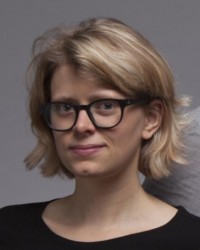Introducing: Lauren Lauret
In February 2015 Lauren Lauret started her PhD project titled 'Meeting practices of the Dutch States General and the continuity of the early modern world of the political (1780-1848)' at the Institute for History, supervised by prof. H. te Velde.
 Wandering around cities like Ghent, Antwerp and Amsterdam, where history is kept alive, my passion for history started when I was ten years old. After dismissing the option to study Law during high school, I started my BA in History at the Radboud University in Nijmegen.
Wandering around cities like Ghent, Antwerp and Amsterdam, where history is kept alive, my passion for history started when I was ten years old. After dismissing the option to study Law during high school, I started my BA in History at the Radboud University in Nijmegen.
During my first year I was given the opportunity to enroll into the Humanities Program of the Radboud Honours Academy. Complementary to the curricular bachelor courses, I could indulge myself into a research project that allowed me to turn my love for scandalous period dramas into my favorite research topic of early modern political history. I studied the transition of norms and values in political thought regarding the Restoration monarchy of Charles II Stuart (1660-1685).
My bachelor thesis focused on the Defensio Regia pro Carolo I by Claude Saumaise (1588-1653). After this first acquaintance with historical research the Research Master Historical Studies was the next logical step in my education.
For my master thesis I switched from the history of splendid early modern monarchies to the history of the Dutch States General at the end of the sixteenth century. From the local archive of Nijmegen my MA thesis tracked down the career of Nijmegen mayor and delegate to the States General Johan Kelffken (ca. 1530 – ca. 1611). The career path of this local office holder allowed for a unique insight into the working relation between local and provincial representative institutions and the States General at a turbulent phase in Dutch history.
Research endeavours
To have a better understanding of my findings on the career of Johan Kelffken I wanted to use the concept of the early modern world of the political and its symbolical political communication as theoretical framework as defined by Professor of Early Modern History B. Stollberg-Rilinger. Therefore I spent the Winter Semester of 2013 as Student Fellow at the Westfälische Wilhelms-Universität Münster supervised by prof. Stollberg-Rilinger.
The following Summer I extended my interest for symbolical communication in early modern politics by participating in the Palatium Summerschool on ‘Court Residences as Places of Exchange in Late Medieval and Early Modern Europe III’. I studied the architecture of political representation in courtly residences, but in my paper I applied this logic of early modern political representation to the rebuilding of the city hall of Nijmegen between 1553 and 1554.
As an extension of my MA thesis and to gain experience in an academic research institute I completed an internship at the Huygens ING research project ‘Repertory of Office-holders 1428-1861’.
Next to my studies in Nijmegen I worked as a student assistant at the Department of History of the Radboud University between 2012 and 2014.
For the Department’s official periodical Ex Tempore – Verleden Tijdschrift I was active as editor and board secretary between 2010 and 2013.
At the 2014 conference of the Koninklijk Nederlands Historisch Genootschap I was a social media reporter.
PhD position
After many hours of study and research (and fun) in Nijmegen I had my eyes firmly set on a PhD position. Supervised by prof. H. te Velde and prof. I.J.A. Nijenhuis (Radboud University), I now have the opportunity to combine the study of the Dutch States General and a restoration monarchy. This time however, the time frame (1747 – 1830) is not within what is perceived to be the early modern period. By the end of my project I hope to have a few new thoughts on that notion. At least I am surrounded by a beautiful city to take a walk in history.
